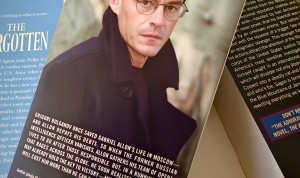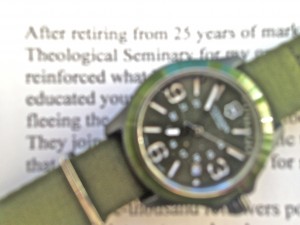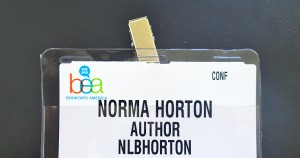Author: normahorton
(This is part of a series about pre-publishing tools.)
Your manuscript is ready. Your flight reservations are made. Your business cards are being printed. Now what the heck are you going to say to agents and acquisitions editors about your work when you arrive at the conference?
Let’s look at preparing the perfect pitch. It’s the most important thing you can do for your writing career, aside from producing the Great American Novel. (In today’s market, even THAT would be a hard sell for an unpublished author.)
1. Look at book covers of authors you read. This was the most valuable investment I made as I tried to figure out how to condense 85,000 words into ten seconds. Find the cover copy; it may be on the back (paperback), or on the inside sleeve (hardcover). Look at the author’s description of his or her story. See strong action words—propel, thrust, critical, tragic? You’re going to have to strip your story to its essentials, and use words like these to engage the listener. Once you’ve found your story’s core, package it so the agent/editor, and finally reader, refuse to put the manuscript down.
made as I tried to figure out how to condense 85,000 words into ten seconds. Find the cover copy; it may be on the back (paperback), or on the inside sleeve (hardcover). Look at the author’s description of his or her story. See strong action words—propel, thrust, critical, tragic? You’re going to have to strip your story to its essentials, and use words like these to engage the listener. Once you’ve found your story’s core, package it so the agent/editor, and finally reader, refuse to put the manuscript down.
2. Consider an outline. If you don’t write by an outline, that’s fine. But if you’re having a hard time streamlining your pitch, consider listing every chapter and, briefly, its contents. You’ll be amazed how little you remember about what occurs in each chapter. This list makes it easier to see the story, and condense from there. Consider this outline a fat pitch, then put it on a strict diet.
3. Make it pretty. Or scary. Or romantic. This is about writing. Writing should manipulate a reader. The point is, your pitch should be consistent with your story’s voice. Think of it as a mini-manuscript. It’s a sales pitch. Invest time to get this right, because you probably won’t get a second chance.
 4. Expand it. That’s right. Make your ten-second pitch a two-minute pitch. Be stingy with what you include, but dress it up a little—throw in a few literary curve balls. Discern what makes your work different enough to be interesting, and include a sliver of that element. But be consistent with tone, and don’t be afraid to stop at a minute and a half.
4. Expand it. That’s right. Make your ten-second pitch a two-minute pitch. Be stingy with what you include, but dress it up a little—throw in a few literary curve balls. Discern what makes your work different enough to be interesting, and include a sliver of that element. But be consistent with tone, and don’t be afraid to stop at a minute and a half.
5. Practice. The previous blog in this series confessed I practiced in front of the bathroom mirror. (I felt like an idiot.) But when I delivered my pitch, and they asked for the longer version, it was as easy as reciting my name and address. I knew the versions cold, and they knew I brought professionalism to my work that inspired confidence, and further queries with my agent.
The concept of perfect pitch is a musical term, and refers to a gift possessed by very few. I suspect the perfect literary pitch is no less rare, and encourage you to beat the odds.
(This is the first in a series about pre-publishing tools.)
Never underestimate the importance of pitching your manuscript to an acquisitions editor face-to-face. If ever there were a deal-breaker, this is it.
My first writers’ conference, the natural place for pitches, netted a full-manuscript request from one of America’s Big Six publishers, and a very fine literary agent who now shops a three-book series to the world. Conferences are expensive and tiring, but excellent places to make contacts you need in publishing. I just returned from BEA (BookExpo America) in NYC, where I met new publishing representatives (the subject of another blog), reconnected with those reviewing my work, and encountered the handsome horse near Central Park.
America’s Big Six publishers, and a very fine literary agent who now shops a three-book series to the world. Conferences are expensive and tiring, but excellent places to make contacts you need in publishing. I just returned from BEA (BookExpo America) in NYC, where I met new publishing representatives (the subject of another blog), reconnected with those reviewing my work, and encountered the handsome horse near Central Park.
Assuming your manuscript is ready to be shopped, these suggestions should help you prepare.
1) Develop a ten-second pitch. I own one watch with a second hand, and I use it to time myself. This pitch needs to be the greatest, most evocative headline you’ve ever written. Mine was, “Would you kill to save your child? Archaeologist Grace Madison did.” This version needs to engage your listener, and trigger immediate questions. Be prepared to give it in an elevator, if necessary. Or in a hotel lobby, or parking garage. Be ready with this one.
2) Develop a two-minute pitch. This is hard. You birthed your manuscript, and know it intimately. Stripping it to its essentials takes time and analysis. I started my two-minute pitch with my 10-second, then moved briskly through beginning, middle, and end. Include an allusion to how the book closes, and don’t leave the agent/editor hanging.
3) Memorize both until they’re second nature.
3) Practice. Then practice more. I stood in front of the bathroom mirror, pitching repeatedly. Use your hands to reinforce your words. (When I used the word, “under,” I acted as if my hands were supporting something.) The visual is as important as the verbal. The more senses you engage, the more invested in listening the agent/editor will be.
4) Dress the part. I always wear an excellent jacket because this IS an important business meeting. The person you’re pitching has to believe you can market your work, wants to be confident you present a professional manner. This isn’t the time to be cute or dress for coffee. It’s a time to look your business best, the way you’d want someone to look if they represented you, as you will the publisher someday. Looks count. (I think that means a well-cut jacket for either sex.)
 5) Take yourself seriously. Don’t giggle. Dial back the bling. (That includes makeup, ladies. Or gentlemen with flair.) Bring the best business cards you can afford. Have at least three people proof your material to ensure it’s free of typos and grammar errors. Be courteous, but formal. Warm, but in control. Professional.
5) Take yourself seriously. Don’t giggle. Dial back the bling. (That includes makeup, ladies. Or gentlemen with flair.) Bring the best business cards you can afford. Have at least three people proof your material to ensure it’s free of typos and grammar errors. Be courteous, but formal. Warm, but in control. Professional.
6) Be aware of your listener. One of the most painful situations I’ve witnessed a man, pitching a rep from a big publishing house, who wouldn’t end his appointment on time. The editor wasn’t interested. Clearly. She finally stood. He remained seated. She looked at her watch. He kept talking. She moved around the table. He started begging. She finally turned to me to ask if I was her next appointment, and apologized for being late. Seriously?
Believe me, you can tell if someone is interested in your work. It’s exhilarating! But save disinterested parties (and yourself) the embarrassment of overstaying your welcome by being aware of body language. A lack of questions means your time is up, regardless of what the clock says.
I’m ankle deep in words. They’re scattered over the old Heriz rug covering my office floor, piling up against the trash can as I prepare a manuscript for professional edit at month’s end. I feel as if I’m sawing off my arm.
 I remember my first journalism class in 1975.
I remember my first journalism class in 1975. (Yes, I really remember that far back.) My Journalism 101 professor marched to the podium. (It was a weed-out class, so about 100 students). Promptly spilled coffee on his khakis. (It was the preppy 70s, for goodness sake). And barked, “Every word has to earn its right to be on the page!” That piece of advice was worth the price of admission, and is the most important thing I recall from my undergraduate study. (He then kicked out a guy reading the school newspaper, a frat boy dumb enough to act cocky on the front row.)
It’s not so much extraneous words creating issues. It’s embellished concepts—things that enhance the story’s appeal to me, but probably bog down a reader. More proactively, I’m targeting anything that doesn’t move my story along. Propel it. As I write about places I’ve been, I actually see the streets, smell the scents, hear the sounds. I know way too much, and love my story and characters as if they were part of my real world. But I must find the precise amount of dialogue and prose needed to create an image for my reader. To do that, I must delete anything that would distract him or her.
It’s a difficult process, but absolutely necessary for a professional manuscript.
I couldn’t accomplish this edit a year ago. I lacked healthy distance. But in twelve months, I’ve developed a storyline for another manuscript. Read new releases from a few of my favorite authors. Reviewed input from sample chapters. I’ve discovered fatty little pockets, and charming, circuitous rabbit trails that are best eliminated, or saved for later work.
Writing is messy business, and I need to vacuum now.[subscribe2]
 “The problem is the monopolisation of power among old men who are unwilling to change any aspect of religion or matter of faith. Indeed, it’s the absence of women from all decisive and leadership roles that sets up the antiquated Vatican and other organised religions against progress.” (http://aje.me/139tvPW)
“The problem is the monopolisation of power among old men who are unwilling to change any aspect of religion or matter of faith. Indeed, it’s the absence of women from all decisive and leadership roles that sets up the antiquated Vatican and other organised religions against progress.” (http://aje.me/139tvPW)
The quote is from al Jazeera, the Arabic news service in Qatar, Monday, May 27. Aside from the fact I think this quote can also apply to American politics, and respect the author for having the courage to submit the article in an Islamic region and country, I have to ask some questions about the presence of this opinion in the world’s leading Arabic news source.
Aren’t most Arab speakers Islamic? Doesn’t Islam dramatically and violently represses  women? Aren’t women’s rights most limited in the Middle East? (Although if India doesn’t get it’s men under control by brutally punishing rape, it’s tying for top spot in my book.)
women? Aren’t women’s rights most limited in the Middle East? (Although if India doesn’t get it’s men under control by brutally punishing rape, it’s tying for top spot in my book.)
Al Jazeera isn’t wrong about the Catholic Church. But this editorial, condemning another religion while representing poster children for egregious discrimination against women (the Middle East and Islam) is disingenuous at best. It’s also totally offensive, as if the writer doesn’t realize the Western world is aware of Islam’s highly discriminatory policies—fully backed by husbands, fathers, brothers, and male-run governments in Islamic states. There’s a cliche here in the States: the pot calling the kettle black. It applies here.
I didn’t know whether to laugh or cry when I read the editorial. But I decided instead to exercise my rights, and blog. Pass the tissue to someone not busy promoting every human’s value, and right to contribute to society to the degree their God-given gifts allow—regardless of the god in which they believe.
It’s been a busy spring. Almost a month in South America for manuscript three. The relaunch of the public platform (website, author photos, YouTube videos…). Four weekends away from my hermitage on writing or family matters. It seems I’ve done everything except write.
 Mr. Bear, a 400-pound cinnamon celebrating hibernation’s end outside my window last week.
Mr. Bear, a 400-pound cinnamon celebrating hibernation’s end outside my window last week.
My second manuscript begins a grueling disastrous calamitous bloody necessary professional edit in thirty days. I haven’t touched it in sixty. It’s been hibernating, like Mr. Bear. Resting, like a yeasty dough. And like that dough, it now must be kneaded.
To maintain some semblance of competance, I’m sweeping it to prepare for the editor. Ignoring it for two months was the best thing I could do.
(In case you’re wondering, ignoring it is a luxury. By the end of July, I’ll have two professionally edited manuscripts, and a third almost complete, ready for professional edit by year’s end. It’s important to distinguish between a professional and a self-edit, BTW. If and when that publishing-contract phone call comes from my agent, I’ll have enough lead time to market all my work well, rather than being overwhelmed by churning out more AND market simultaneously. I like a head start in life.)
The concept of healthy distance applies to writing. I’m not catching all logic flaws and grammar errors—I birthed this 82,000-word document, and love it, so I’m almost as immune to its problems as I am to the imperfections in my children. (They don’t have any.) But the fact that the prose has slipped into my deep subconscious allows me to see things more clearly, ask questions, investigate structure, and most importantly, look for options. Is there a better way to frame this scene? Am I telling instead of showing? Is the sense of smell present in this chapter? Am I being repetitively redundant? (That’s a joke.) Questions I couldn’t ask immediately after finishing the document flood my mind now, and I dissect with surgical skill, knowing the blood will REALLY flow in a month or so.
My advice? If you can, let your work rest. Read favorite writers, see good movies, get exercise, hang with family and friends. Then reapproach the work as a neighbor, not a mother. I suspect you’ll be proud, but able to make constructive changes to create a more professional, compelling story.
How do you approach your self-edit? Do you believe a self-edit is possible? I’m interested, as always!
 made as I tried to figure out how to condense 85,000 words into ten seconds. Find the cover copy; it may be on the back (paperback), or on the inside sleeve (hardcover). Look at the author’s description of his or her story. See strong action words—propel, thrust, critical, tragic? You’re going to have to strip your story to its essentials, and use words like these to engage the listener. Once you’ve found your story’s core, package it so the agent/editor, and finally reader, refuse to put the manuscript down.
made as I tried to figure out how to condense 85,000 words into ten seconds. Find the cover copy; it may be on the back (paperback), or on the inside sleeve (hardcover). Look at the author’s description of his or her story. See strong action words—propel, thrust, critical, tragic? You’re going to have to strip your story to its essentials, and use words like these to engage the listener. Once you’ve found your story’s core, package it so the agent/editor, and finally reader, refuse to put the manuscript down. 4. Expand it. That’s right. Make your ten-second pitch a two-minute pitch. Be stingy with what you include, but dress it up a little—throw in a few literary curve balls. Discern what makes your work different enough to be interesting, and include a sliver of that element. But be consistent with tone, and don’t be afraid to stop at a minute and a half.
4. Expand it. That’s right. Make your ten-second pitch a two-minute pitch. Be stingy with what you include, but dress it up a little—throw in a few literary curve balls. Discern what makes your work different enough to be interesting, and include a sliver of that element. But be consistent with tone, and don’t be afraid to stop at a minute and a half.




